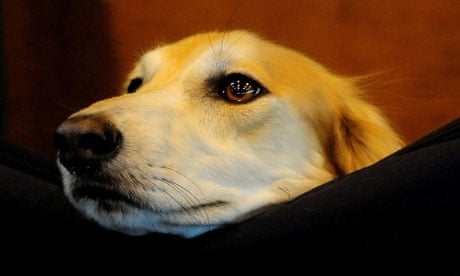Recently a visitor from Iran assured me that her dog was staying at a five-star spa in Tehran for the duration of her trip. I had no idea she had a dog in the first place, but was struck that she had insisted in telling me such a thing. Over the past few years, dog ownership has become yet another unlikely arena for the social and political dispute within the tumultuous politics of Iran.
It is well known that dogs, along with pigs, are considered unclean in Islam. Strictly speaking, the theology doesn't ban their ownership, or petting; the Sunna prescribes that dogs are "pollutants", contact with them rendering believers ritually unclean. This means that ritual cleansing is required before one is able to perform prayers. Despite this, dogs have been kept by Muslims for centuries. For example, salukis, an ancient breed of hunting dog, have historically been valued by the Bedouin, who breed them for both their beauty and their prowess in hunting.
However, having domesticated animals free to roam inside a house, contact with which would require ritual cleansing, would be quite tricky from a practical point of view for Muslims who are required to pray five times a day – even though there is no actual legal prohibition of dog ownership.
The Islamic Republic of Iran makes not only the application of the laws of Islam its constitutional duty, but also the promotion of godly behaviour its social remit. It has an Orwellian state ministry tasked with the promotion of "better behaviour" according to Islamic mores. This is the sharpest point at which the ideological state comes into contact with a people, who are at least as fun loving as they are God fearing.
Even though a Saudi-style morality police has no place in a much more modernised, sophisticated and complex country such as Iran, nevertheless, official and semi-official state agents conduct waves of enforcement against manifestations of un-Islamic social conduct. Laxed hijabs of young women are a primary target – such clampdowns are conducted in well-anticipated cycles, once or twice a year. Being a pragmatic state with already strained resources, the Iranian government announces such clampdowns well in advance in order to reduce the number of confrontations. Street patrols stop, admonish and occasionally fine or arrest the offenders. The very fact of the announcement makes it clear the ritualistic nature of such campaigns.
The state prohibition of anything in Iran is an open invitation for its widespread social promotion. Blond hair and garish makeup, nose jobs (of which Iran is the world capital) and extravagantly sculpted and gelled hairstyles for boys are all forms of sedition – political statements with a small "p". The state's legitimacy is thus questioned and openly ridiculed, at least by a certain section of the population.
As it happens, opponents of the state and its ideology also have the means and the spare time to indulge in such practices because they are, by and large, members of the affluent urban elite. But the religiously informed state disapproval of dogs in Iran has a deeper resonance than a garish pair of Dolce & Gabbana crystal-studded sunglasses. Before the Muslim invasion and conversion, Iran's state religion was Zoroastrianism. In ancient Iran, dogs were particularly treasured and well-treated animals. The Gathas were explicit in the promotion of dogs as good and godly creatures; furthermore, the Zoroastrians believed that the bridge to the afterlife was guarded by dogs, so being nice to dogs in this world might have its reward in the hereafter.
After the Islamic conquest and the gradual but eventual mass conversion of Iranians from their national religion, disdain for dogs was not only a way for the conquerors of humiliating nation but a way for the new converts to prove their devotion to their new religion. Cruelty to and avoidance of dogs was the equivalent of the dried ham for the reconquistadors in Spain, where the newly converted Jews and Moslems were forced to keep pigs and to eat them to confirm the earnestness of their conversion.
The past 1,400 years or so haven't been that much fun for dogs in Iran. All that has come to change paradoxically through the very same religion responsible for their plight. Their recent popularity and adulation must have taken Iranian dogs by surprise. Dogs are now as much symbols of safe, middle-class resistance as false eyelashes and green wristbands. Pooches have never had it so good, and rare breeds, especially small lap dogs, change hand for tens, sometimes hundreds of thousands of dollars.
An underground industry of dog beauty parlours thrives, mostly run out of private homes, as do a plethora of canine protection and welfare charities. A legal and substantial kennel industry has developed into what is fancily called "dog spas" where the middle class deposit their dogs when on holiday or, in the case of some of my conflicted relatives, when a devout auntie comes to stay.
The industry booms further every time a firebrand preacher calls for their banning or admonishes dog owners from such platforms like the much loathed national radio and TV. Its been a long time coming, but Iranian dogs are having their day.
